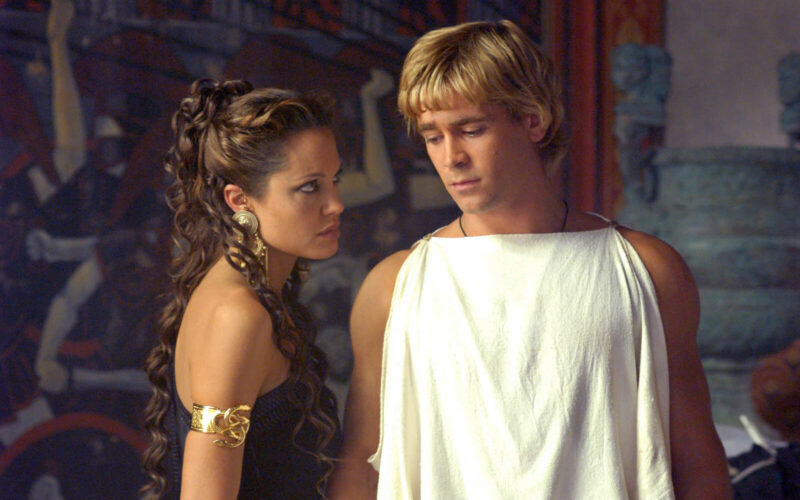Alexander tells the story of Alexander III of Macedon, the ancient conqueror who created one of the largest empires the world had ever seen by the age of 30. Starring Colin Farrell in the title role, the film follows Alexander from his early years under the influence of his parents—his domineering father King Philip II (Val Kilmer) and his scheming mother Olympias (Angelina Jolie)—to his death at the age of 32, after conquering lands stretching from Greece to India.
Oliver Stone’s vision for Alexander was nothing short of epic. Known for tackling complex historical and political figures in films like JFK and Nixon, Stone attempted to give the ancient world the same level of intricate detail, with lavish sets, stunning battle sequences, and a narrative that spanned Alexander’s entire life. The film was shot across multiple continents, from Morocco to Thailand, with elaborate re-creations of the battles of Gaugamela and Hydaspes, and sought to depict the grandeur of Alexander’s military conquests and the internal struggles of a man with a complex legacy.
Despite its grand scale and ambition, Alexander was met with controversy and mixed reviews upon its release. Critics were divided over its historical accuracy, narrative structure, and Stone’s handling of Alexander’s relationships, particularly his bisexuality. The film’s pacing and Farrell’s portrayal of Alexander as a vulnerable, emotionally complex leader also drew polarized reactions.

Audiences and historians alike debated the film’s portrayal of key events in Alexander’s life, including his close relationship with Hephaestion (played by Jared Leto), his conquests in Persia and India, and his ultimate fall. The film’s ambitious attempt to cover so much of Alexander’s life in a single narrative left some feeling that it was overstuffed and unfocused, while others admired its reach and historical depth.
In the years following its release, Oliver Stone returned to Alexander multiple times, offering various re-edits and extended versions of the film. These included Alexander Revisited: The Final Cut (2007), which expanded the narrative to over three-and-a-half hours, and a later Ultimate Cut in 2014. Each of these versions has been met with increased critical appreciation, with some arguing that Stone’s extended cuts gave the story more clarity and emotional weight, allowing for a fuller exploration of Alexander’s relationships, ambitions, and tragic end.
The multiple versions of Alexander reflect Stone’s own struggle to craft a definitive vision of the historical figure. Over time, many have come to see the film as an underrated epic, with its ambitious scope, detailed re-creation of ancient history, and rich characterizations gaining more appreciation with age.
Now, 20 years after its release, Alexander continues to provoke conversation about how we depict historical figures in film. It was a film ahead of its time in its depiction of sexuality and identity, and its willingness to explore the emotional vulnerabilities of a conqueror whose life was shaped by immense power, ambition, and inner turmoil. Stone’s attempt to humanize Alexander, rather than simply glorify his conquests, sets the film apart from more traditional historical epics.
Alexander may not have achieved universal acclaim upon its release, but it remains a significant entry in Oliver Stone’s filmography. It serves as both a historical artifact and a deeply personal film about one of history’s most fascinating and enigmatic figures. As we reflect on the 20th anniversary of Alexander, it is a reminder of the challenges and rewards of capturing a figure as monumental and complex as Alexander the Great in a single film.
In its grandiosity, ambition, and imperfections, Alexander continues to endure as a bold cinematic attempt to portray a life that shaped the course of history.









